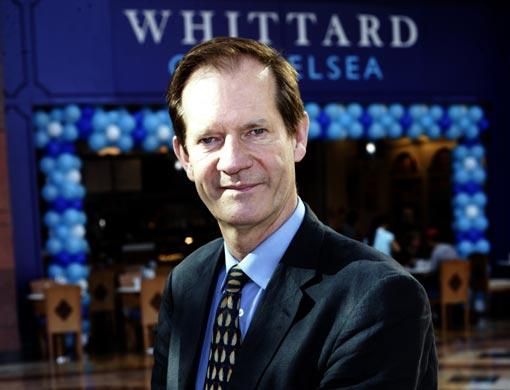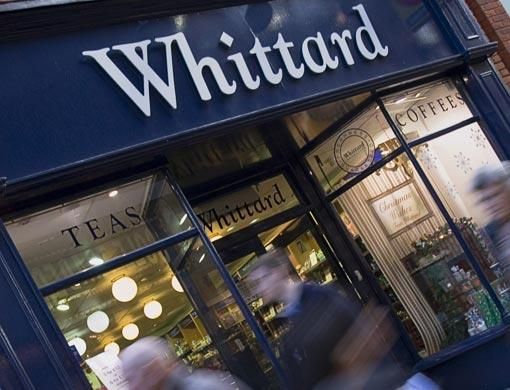Giles Hilton loves coffee ... so much so that he downs close to 40 cups of the brew a day. But then isn't that expected of a master blender and product director for Whittard of Chelsea? Shalaka Paradkar met him ... over a cup of coffee.
"The rest of the world thinks England stops at 4 o'clock for tea. That's not true at all. We stop at 11 o'clock as well," says Giles Hilton, chuckling.
Hilton, a charming raconteur, master blender and product director for Whittard of Chelsea, was in Dubai to attend the store opening at Dubai Festival City. (The franchisee is the Al Madani group, Dubai.)
Whittard of Chelsea, experts in tea and coffee, was established in 1886. Over the years, the house of Whittard has led the movement away from house blends into new origin coffees. It also saw the revival of herbal teas and started the flavoured tea boom.
Hilton paints evocative pictures of the places he has been and the brews he has tasted.
"There is no right or wrong way to drink tea. Too many people think they should [drink tea] in a certain way. Tea is the most versatile of beverages. You need to understand what you want and brew it accordingly," he says.
Hilton travels to tea-producing countries to visit suppliers, get a feel of the crop and season, study new production techniques and advise growers on customers' changing tastes.
While a connoisseur of the rarest and finest teas and coffees, he is also guilty of creating flavours like Sticky Toffee Pudding and Cinnamon Orange Rooibos.
Through Hilton's scrapbook of experiences, one is introduced to the familiar and the exotic: of tea gone brittle when grown in hot, tired soil or sweetened by the rain which fell five days before it was plucked ...
I
My colleagues at Whittard call me the Nose. It is a moniker I earned as I am always sticking my nose into samples to determine quality, strength and flavour. I like to smell tea, but also [like to examine samples of] the soil where it is grown. My nose tells me more than my tastebuds do.
I am lost when I cannot have tea or coffee. I was once sailing with my brother on his boat and all I could find was a saucepan to boil water. I brewed coffee in a plastic bucket! It was just a bit thick, but then nothing can come between me and my coffee.
I enjoy cooking. It is creative self-expression. I am not afraid to experiment with spices or unfamiliar ingredients. I cook well. I can cook Chinese, Indian, classic English and French food.
I go through periods of coffee overdose. It horrified my doctor when he found out I have eight 'cafeteras' [coffee pots] of coffee a day with five cups to a cafetera. Somehow I can cope.
ME
Me and my farming roots
I grew up on my father's farm in Kent in the '50s and '60s. It was a mixed farm with domestic animals such as dairy herd, chicken and sheep as well as wheat and barley crops.
Recently, at a coffee plantation, I was talking about the soil when I realised that the two men with me were staring. I had knelt, picked up a handful of soil and was smelling it. To me, it was the most natural thing to do. My farming background has helped me understand the difficulties in producing good crop.
I left the farm at 18 and set off to London to study accountancy. Father never asked me if I wanted to farm. He saw the changes in the old farming ways. It wasn't just about the pride of farming anymore. Instead, it involved government controls and price fixing.
Me and joining Whittard
I drifted through different jobs for the first eight years of my working life. Then in 1976, I began working with Richard (Dick) Whittard, the son of the founder, Walter Whittard.
We had a pleasant social life. Richard would ask me to taste teas with him in the afternoon. I was an amateur. I used to drink tea like most English people - without analysing.
The retail area in the old shop on Fulham Road was quite small. There were a few tins and packets of tea, teapots and caddies on display. At the back, there was a 500-pound capacity tea-blending drum where original and blended teas were stocked.
During the mornings, I roasted coffee beans over an open gas roaster. Sometimes in an attempt to high roast for stronger coffee, the beans would catch fire! Through these unhappy incidents, I got to know the local fire brigade. But more importantly, it taught me respect for roasting. In the evening, I would maintain books.
It took me five years to begin to understand the ingredients in a blend and what affected flavour.
Darjeeling tea, made of the second pickings or second flush [burst of new growth on a plant], used to be popular.
The first flush wasn't sold. In time, plantations realised the first flush resulted in a wonderful, sweet, delicate and fragrant tea. Old Mr Whittard did not know much about this tea, so it fell upon me to introduce it. Now 15 years later, it has overtaken the market for second flush.
The coffee and tea trade is just like farming - it's weather or politics every time! I have braved hurricanes that have destroyed coffee plantations and floods that have ruined tea crops. I have also dealt with political unrest in plantations.
I get frustrated by the politics in different countries. I also worry about the hardworkers like the tea pickers and the people they work for.
Local upheavals and unrest make things very difficult in the tea trade. It's a lot more personal than just the matter of not being able to source a particular ingredient for the blend.
Me and my innovations
Whittard is an established old-fashioned tea and coffee business. We got on well with our house blends and a few single-origin teas. In the late '80s, younger people, fed up of strong brown teas, wanted something different.
I was like a little boy with a chemistry set at home. I was experimenting with black flavoured teas. I tried blends of nature-identical flavourings such as concentrated mango juice and vanilla and additions like seaweed extract for shelf life. I had to figure out what people would like. It was an exciting process.
In the '90s, women's magazines started advocating green tea and linking it to good health. The challenge then was to make green tea more acceptable to English and European palates. The answer was to offer more variety. I found that by blending Chinese green [tea] with Japanese [tea] we could flavour it.
Me and Darjeeling
The air is so fresh in Darjeeling it makes you choke! The area is ethereal. I buy my Darjeeling [tea] from four or five gardens (of the 86 that survive). My favourite is Margaret's Hope.
When I visit tea estates, I often take a walk in the morning, as early as 4 am. Sometimes I startle the locals who are just stirring awake, started their day with a fire in the backyard to brew their morning tea.
When people learn of my visit, eight to 10 estate managers will approach me with samples. There is usually a large crowd at these tasting cermonies. Whittard buys and sells direct, and estate managers know what the consumer wants.
I also adore Sri Lanka. I have met the most wonderful people on earth there. It hurts that this place is beset with violence. When I am here, I hitchhike, take the local buses and wander around tea gardens. Often I am invited to have a cup of tea and to talk about the business.
Sri Lanka's semi-tropical climate makes it attractive in a different way. The landscape is so green and fertile, it is like a [huge] bumpy billiard table ... it is as if someone had covered the hills with green baize.
Me and my travels
Whittard is rare in that we retail both coffee and tea; and these drag me in opposite directions.
I don't know if I am a fearless traveller, but very little stops me from travelling. I have been held up at gunpoint a few times [in different parts of the world], which I have found quite annoying.
My travelling is to do with the seasons. Coffee is harvested from November to January. Then about three months later, I am in south and central America, judging coffee competitions run by a group called Cup of Excellence. I terrify my highly-organised American hosts who believe I should not be left alone.
I travel to Darjeeling in April-May in time for the first flush and to see what the season holds. Every three years or so, I am in Sri Lanka in August.
I also go to Japan to lecture on tea. This is funny because their tea culture is one of the most refined in the world. But they want to know about the English way of drinking tea!
MYSELF
These days a lot of attention is given to the provenance of what we eat and how it affects the environment. What have been the repercussions for your business?
The English have been happy to accept cheap, mass-produced food for a long time. Supermarkets have been guilty of that.
The foodie element in England wants to know the provenance of every food item. Unfortunately, they just read the label. If it says organic, they buy it. There's a lack of thorough questioning.
Whittard has many teas which are single estates. If you wanted Assam, I could give Orangajuli, Borengajuli or Harmutty, one of the oldest gardens which produces the sweetest, solid-tasting tea.
For me, provenance means finding the best gardens, buying the tea, using it in blends, but also getting the day's picking to sell on its own. That practice has gained for Whittard a select group of customers. We have people we call when the first flush of say, Harmutty, comes into the shop.
Provenance is also over hyped by some. This is a great pity. In England, I love buying vegetables over the farm gate if I am in the countryside. I am happy to buy from a producer, and to know it's fresh, and hope that he has put care and attention into it.
But the business of provenance can become a bit pretentious and over-shrouded with political correctness, which can get annoying.
The origin-related labels give you no assurance of quality or taste. I would rather not worry whether a tea is organic or not. I know that they won't drag cans full of chemicals over the mountainside and trickle them over the old tea bushes.
Good farmers always care, and by Jove, it shows in the taste; and their pride in what they grow.













